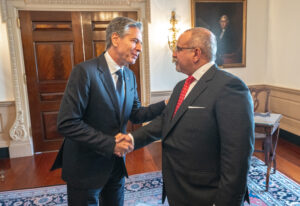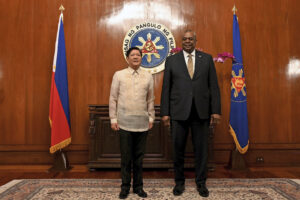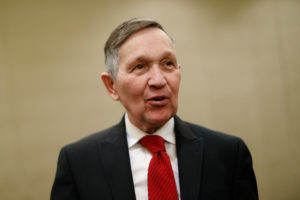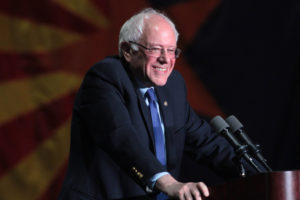Forgetting the Lessons of Vietnam
What has the U.S. foreign policy establishment learned in the fifty years since the Paris Accords? American Soldiers Protecting Vietnamese Children / Flickr
American Soldiers Protecting Vietnamese Children / Flickr
Friday, January 27th, marks 50 years since the signing of the Paris Peace Accords by representatives from the United States, North and South Vietnam effectively ending American participation in the Vietnamese civil conflict. What the Georgetown University international relations scholar Charles Kuphan calls an “isolationist impulse” made a “significant comeback in response to the Vietnam War, which severely strained the liberal internationalist consensus.”
As the Cold War historian John Lamberton Harper points out, President Jimmy Carter’s hawkish Polish-born national security adviser Zbigniew Brzezinski scorned his intra-administration rival, the cautious, gentlemanly secretary of state Cyrus Vance as “a nice man but burned by Vietnam.” Indeed, Vance and a number of his generation carried with them a profound disillusionment in the aftermath of Vietnam which shaped their approach to the world. And for a short time, the “Vietnam Syndrome,” (shorthand for a wariness and suspicion of unnecessary and unsupportable foreign interventions) occasionally informed policy at the highest levels and manifested itself in the promulgations of the Wienberger and Powell Doctrines which, in theory anyway, were set up as a kind of break on unnecessary military adventures.
But only hours after the successful conclusion of the First Gulf War, President George H.W. Bush declared, “By God, we’ve kicked the Vietnam Syndrome once and for all.”
And kick it Bush did: In the decades following his 1991 pronouncement, the United States has been at war in one form or another (either as a belligerent or unofficial co-belligerent as is the case with our involvement in Saudi Arabia’s war on Yemen and in Ukraine) for all but 2 of the 32 years that have followed.
The political-media atmosphere that now prevails in Washington makes it exceedingly difficult to believe such a thing as a ‘Vietnam Syndrome’ ever existed. Indeed, President Joe Biden’s handling of the war in Ukraine has been met with rapturous approval from the Washington media establishment, winning plaudits from all the usual suspects.
But what kind of success is it really, when the entire thing might have been avoided by judicious diplomatic engagement? Are we really to believe that a war resulting, so far, in 200,000 dead and 8 million displaced, has been worth an empty promise of NATO membership?
The caution which, albeit all-too-temporarily, stemmed from the “Vietnam Syndrome” is today utterly absent in the corridors of power in Joe Biden’s Washington.
While the war has currently ground to a stalemate, the legacy media and various and sundry think-tank-talking-heads issue regular assurances of steady progress in the field and victory soon to come.
- Writing in the Journal of Democracy this past September, political scientist and author of the End of History and The Last Man Francis Fukuyama exulted: “Ukraine will win. Slava Ukraini!”
- Washington Post reporter Liz Sly told readers in early January 2023 that “If 2023 continues as it began, there is a good chance Ukraine will be able to fulfill President Volodymyr Zelensky’s New Year’s pledge to retake all of Ukraine by the end of the year — or at least enough territory to definitively end Russia’s threat, Western officials and analysts say.”
- Newsweek, reporting in October 2022, informed readers by way of activist Ilya Ponomarev, a former member of the Russian parliament, that “Russia is not yet on the brink of revolution…but is not far off.”
- Rutgers University professor Alexander J. Motyl agrees. In a January 2023 article for Foreign Policy magazine titled ‘It’s High Time to Prepare for Russia’s Collapse’ Motyl decried as “stunning” what he believes is a “near-total absence of any discussion among politicians, policymakers, analysts, and journalists of the consequences of defeat for Russia. … considering the potential for Russia’s collapse and disintegration.”
- Also in early January, the former head of the U.S. Army in Europe, Lt. General Ben Hodges told the Euromaidan Press that, “The decisive phase of the campaign…will be the liberation of Crimea. Ukrainian forces are going to spend a lot of time knocking out or disrupting the logistical networks that are important for Crimea…That is going to be a critical part that leads or sets the conditions for the liberation of Crimea, which I expect will be finished by the end of August.”
As Gore Vidal once quipped, “There is little respite for a people so routinely—so fiercely—disinformed.”
Conspicuous by its absence in what passes for foreign policy discourse in the American capital is the question of American interests: How does the allocation of vast sums to a wondrously corrupt regime in Kiev in any way materially benefit everyday Americans? Is the imposition of a narrow, sectarian Galician nationalism over the whole of Ukraine truly a core American interest? Does the prolongation of a proxy war between NATO and Russia further European and American security interests?
In truth, the lessons of Vietnam were forgotten long ago. The generation that now largely populates the ranks of the Washington media and political establishment came of age when Vietnam was already in the rearview. Today, the unabashed liberal interventionists who staff the Biden administration came up in the 1990s when it was commonly thought the United States didn’t do enough, notably in Bosnia and in Rwanda. As such, and almost without exception, they have supported every American mis-adventure abroad since 9/11.
The caution which, albeit all-too-temporarily, stemmed from the “Vietnam Syndrome” is today utterly absent in the corridors of power in Joe Biden’s Washington. The Vietnam Syndrome is indeed kicked: Dead and buried.
But we may soon regret its passing.
Your support matters…Independent journalism is under threat and overshadowed by heavily funded mainstream media.
You can help level the playing field. Become a member.
Your tax-deductible contribution keeps us digging beneath the headlines to give you thought-provoking, investigative reporting and analysis that unearths what's really happening- without compromise.
Give today to support our courageous, independent journalists.






You need to be a supporter to comment.
There are currently no responses to this article.
Be the first to respond.